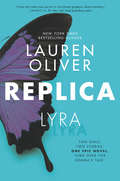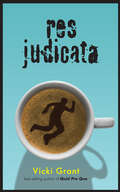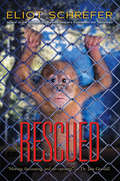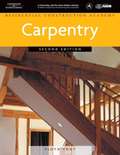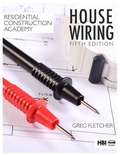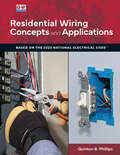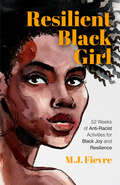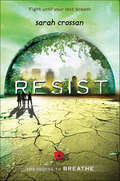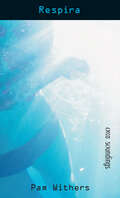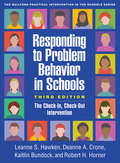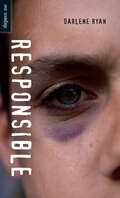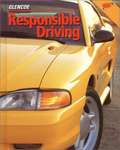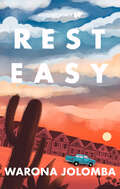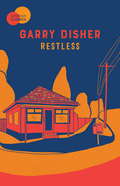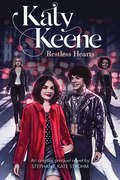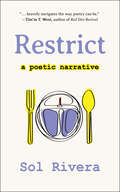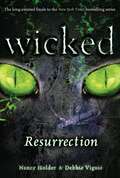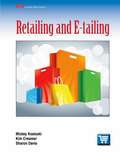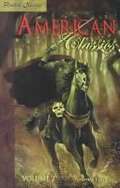- Table View
- List View
Replica (Replica #1)
by Lauren Oliver<p>Two girls, two stories, one epic novel. <p>From Lauren Oliver, New York Times bestselling author of <i>Before I Fall</i> and the <i>Delirium</i> trilogy, comes an epic, masterful novel that explores issues of individuality, identity, and humanity. <p><i>Replica</i> contains two narratives in one: Lyra's story and Gemma's story. The stories can be read separately, one after the other, or in alternating chapters. The two distinct parts of this astonishing novel combine to produce an unforgettable journey. <p>Lyra's story begins in the Haven Institute, a building tucked away on a private island off the coast of Florida that from a distance looks serene and even beautiful. But up close the locked doors, military guards, and biohazard suits tell a different story. In truth, Haven is a clandestine research facility where thousands of replicas, or human models, are born, raised, and observed. When a surprise attack is launched on Haven, two of its young experimental subjects--Lyra, or 24, and the boy known only as 72--manage to escape. <p>Gemma has been in and out of hospitals for as long as she can remember. A lonely teen, her life is circumscribed by home, school, and her best friend, April. But after she is nearly abducted by a stranger claiming to know her, Gemma starts to investigate her family's past and discovers her father's mysterious connection to the secretive Haven research facility. Hungry for answers, she travels to Florida, only to stumble upon two replicas and a completely new set of questions. <p>While the stories of Lyra and Gemma mirror each other, each contains breathtaking revelations critically important to the other story. <p>Using hotlinks in this electronic edition, readers can decide how they would like to read the book, as with the print version. They can read the story of Gemma or Lyra straight through first, followed by the other girl's story, or they can move between chapters in Lyra's and Gemma's sections. <p>No matter how it is read, <i>Replica</i> is an ambitious, thought-provoking masterwork.
Reporteros 1
by Luis Enrique Elías Sharon Ferrer Sonia Josa Evelyn Alizo Fernando Pomar Linda VilladónigaNIMAC-sourced textbook
Represent: The Unfinished Fight for the Vote
by Marc Favreau Michael Eric DysonRead about the electrifying and continuing fight for voting rights—and discover your place in it—in this dramatic exploration of American democracy, from renowned thought leader Michael Eric Dyson and widely celebrated author Marc Favreau. One of the most important and least understood true stories of our nation, the fight for representation is an ongoing and epic quest to build the democracy sketched out in the Constitution but unfinished in the twenty-first century. <P><P> With impeccable research and exhilarating prose, Represent tells the story of voting rights in the United States from the American Revolution up to the present day. Each chapter takes on a new battle between the forces of people power and forces opposed to it. Readers will meet champions of freedom, including formerly enslaved revolutionaries, a Chinese American teenager, a Lakota Sioux activist, Black World War II veterans, a Mexican American student, and others who fought for their right to vote. Drawing clear lines from then to now, Represent weaves this important struggle into a single American drama that will help readers understand our past, present, and future.
Res Judicata
by Vicki GrantCyril MacIntyre, son of firebrand lawyer Andy MacIntyre, smells something fishy about one of his mother's cases. And it's not just that there are sea lice in the coffee. When Cyril starts investigating the death of a millionaire inventor, he gives a whole new meaning to the term "legal aid." Long on smarts and short on—well, just plain short, Cyril tangles with deranged criminals, indulges in a little bit of B & E and confronts the scariest person in the world—his mother.
Rescued (Ape Quartet #3)
by Eliot SchreferFrom two-time National Book Award finalist Eliot Schrefer comes an unbelievable story of survival.Raja has been raised in captivity. Not behind the bars of a zoo, but within the confines of an American home. He was stolen when he was young to be someone's pet. Now he's grown up . . . and is about to be sent away again, to a place from which there will be no return. John grew up with Raja. The orangutan was his friend, his brother -- never his pet. But when John's parents split up and he moved across the country, he left Raja behind. Now Raja is suffering.There's one last chance to save Raja -- a chance that will force John to confront his fractured family and the captivity he's imposed on himself all of these years.Eliot Schrefer's last two novels, Endangered and Threatened, were both finalists for the National Book Award. With Rescued, he brings his remarkable storytelling to the American landscape, giving us a boy who must redefine his own humanity and an orangutan who will need his help in order to return home.
Residential Construction Academy: Carpentry
by Floyd VogtThis new edition for Carpentry from Delmar's Residential Construction Academy Series, introduces users to skills and information required to work professionally on any job site. Based on nationally-recognized standards set by the construction industry, this book is organized into four sections; "Tools and Materials", "Rough Carpentry", "Exterior Finish", and "Interior Finish". New topics have been added in this edition to the Power Tool, Building Foundation, Wall Framing and Finish Carpentry chapters. Extensively illustrated and succinctly written, nearly every chapter contains special "Procedure" sections that combine precise, step-by-step instructions with helpful drawings, making it easy to master tasks. Safety is emphasized and safety cautions are highlighted throughout. Definitions of industry terms at the start of each chapter are also included to help facilitate learning.
Residential Wiring Concepts and Applications
by Quinton B. PhillipsResidential Wiring Concepts and Applications includes a comprehensive, abundantly illustrated, pedagogically strong text, a lab workbook with hands-on activities, and videos, providing a complete solution for introductory courses. Adhering to the 2023 National Electrical Code® (NEC), the textbook introduces entry-level students to fundamental concepts and applications that will be encountered in the workplace. It is divided into two complementary parts: Part I, Basic Knowledge and Skills, covers the necessary knowledge and skills to perform electrical work, providing a firm foundation for students with no prior knowledge; Part II, House Wiring, concentrates on the NEC requirements and practical wiring of a residence in a logical order of operations. With a clear and engaging writing style, the content is organized into digestible chapters to reinforce learning comprehension, followed immediately by real-world applications.
Resilient Black Girl: 52 Weeks of Anti-Racist Activities for Black Joy and Resilience (Badass Black Girl Ser.)
by M. J. FievreAn Empowering Antiracist Book for Teens"Resilient Black Girl is a timely and powerful book for our Black girls and girls of color to reclaim their confidence and be beacons of courage and hope for generations to come."?Shanicia Boswell, author, Oh Sis, You’re Pregnant!#1 New Release in Social Activists, Maturing, Women, and Teen & Young Adult 21st Century United States HistoryAs a social justice book for teens and a book about racism, Resilient Black Girl provides Black teen girls a better understanding of the effects of racism and equips them with skills for navigating spaces in their daily lives.An antiracist book for teens about the realities of being Black and combating racism. Young Black girls and young Black women are powerful. Unfortunately, you will face microaggressions and racism in your daily life. Resilient Black Girl empowers you to be brave and face challenges of oppression. Become a community leader and an important member of society. In the spirit of the Black Lives Matter movement, learn to be a positive element in your community through allyship and activism. This journal and activity workbook provides the steps to achieving your personal and public goals.Grow in confidence. Black girls have many gifts; one is resiliency. While you are strong and can overcome anything, racism affects physical and mental health. As an antiracist book for teens, Resilient Black Girl teaches Black teen girls about racism and helps them discover how to be kind to themselves and to love and take care of themselves.Learn how to: Understand and combat racism and microaggressions Become a community leader Be brave, empowered, and self-reliantSeeking young adult nonfiction social justice books for teens? Resilient Black Girl is the perfect read for Black teen girls, especially if you enjoyed Badass Black Girl, This Book Is Anti-Racist, or Well-Read Black Girl.
Resist (Breathe Books #2)
by Sarah CrossanThe shocking and thrilling sequel—and conclusion—to Breathe, which Kirkus Reviews called "intelligent and absorbing." Three teens confront danger, uncertainty, and the yearning to live—and breathe—freely. This powerful dystopian novel is for fans of Veronica Roth and Patrick Ness.What would you do if you were desperate? Bea, Alina, and Quinn are outlaws. They started a rebellion and have been thrown out of the pod—the only place where there's enough air to breathe. Bea has lost her family. Alina has lost her home. And Quinn has lost his privileged life. What will they find now that they are refugees in the perilous Outlands? Their final safe haven may be harboring dark secrets. But together, the three teens find the will to keep fighting, to save one another, and to break free from everything that's holding them back.Acclaimed author Sarah Crossan has created a dangerous, shattered society, and brought to life three teenagers who come into their own in the most heartbreaking ways. A wrenching, thought-provoking, and unforgettable post-apocalyptic novel.
Respira: (Breathless) (Spanish Soundings)
by Pam WithersBeverly está en Hawaii ayudando a su tío en su tienda de submarinismo, aprendiendo a bucear y tratando de bajar de peso y conseguir novio. Cuando Garth, un excelente buzo, se interesa por ella, Beverly está feliz, hasta que resulta que a Garth no le interesa más que una cosa. Cada vez más débil por la drástica dieta que se impuso ella misma, Beverly se encuentra en graves problemas cuando tiene que defenderse de Garth bajo el agua. Beverly is in Hawaii, helping her uncle at his dive shop, learning how to dive and trying to lose weight and get a boyfriend. When Garth, an accomplished diver, shows an interest in her, Beverly is ecstatic, until it turns out Garth is only interested in one thing. Struggling with failing strength from her self-imposed starvation diet, Beverly finds herself in deep trouble when she has to fight Garth off underwater.
Responding to Literature: World Literature
by Mary Hynes-Berry Basia C. Miller Susan D. Schaffrath Rebecca Hankin Ted Johnson Ursula McpikeResponding to Literature is a series for the way you really read, the way you really think, the way you really write. As you use this book in the series, you will learn new ways of exploring literature, and you will discover personal meanings in works that are part of your literary heritage.
Responding to Problem Behavior in Schools, Third Edition: The Check-In, Check-Out Intervention (The Guilford Practical Intervention in the Schools Series)
by Leanne S. Hawken Robert H. Horner Deanne A. Crone Kaitlin BundockNow revised and expanded with the latest research and adaptations for additional target behaviors, this is the gold-standard guide to Check-In, Check-Out (CICO), the most widely implemented Tier 2 behavior intervention. CICO is designed for the approximately 10–15% of students who fail to meet schoolwide behavioral expectations but who do not require intensive, individualized supports. In a large-size format for easy photocopying, the book includes step-by-step procedures and reproducible tools for planning and implementation. At the companion website, purchasers can download and print the reproducible tools and can access online-only training materials, sample daily progress reports, and an Excel database for managing daily data. (Second edition subtitle: The Behavior Education Program.) New to This Edition *Chapters on CICO in alternative educational settings and for students with internalizing behavior problems. *Content on using CICO for attendance issues, academic and organizational skills, and recess behavior problems. *Chapter on layering additional targeted interventions onto CICO. *Chapter with specific recommendations for training and coaching school teams. *Expanded chapters on frequently asked questions, implementation in high school, and culturally responsive practices. *Supplemental online-only training and data management tools. *Updated throughout with current data and evidence-based procedures. See also Dr. Hawken's training DVD, Check-In, Check-Out, Second Edition: A Tier 2 Intervention for Students at Risk. Also available: the authors' work on intensive interventions for severe problem behavior, Building Positive Behavior Support Systems in Schools, Second Edition: Functional Behavioral Assessment. This book is in The Guilford Practical Intervention in the Schools Series, edited by Sandra M. Chafouleas.
Responsible (Orca Soundings)
by Darlene RyanKevin Frasier is in a new high school—his fourth in the last year. He is trying to get along and not cause any waves. When he falls in with Nick and his friends, Frasier ends up going along as the group bullies and threatens their way through the school. When Nick starts tormenting Erin—and she stands up to him—the harassment escalates until Kevin is forced to make a difficult decision and risk everything.
Responsible Driving
by Mcgraw-Hill Staff American Automobile Association StaffThis classroom-tested program, developed with the American Automobile Association (AAA), has been updated to reflect the changes surrounding teen driving. Everything your students need to know about driving is included - from graduated driver licensing to zero tolerance laws to information about vehicle maintenance. There's even a new chapter that emphasizes the facts about driving today's larger, heavier sport utility vehicles, pickup trucks, and vans.
Rest Easy
by Warona JolombaWords have the power to heal"We're not friends. We're just volunteer partners.Once our shift is over, we don't know each other.""I hate you sometimes.""What about the rest of the time?"" . . . the opposite, I guess."Heartsick from the death of his mother and heartsore from breaking up with his girlfriend, Dee Warrington is barely getting by. Eccentric with mad style, Naya’s had straight As since the seventh grade, and when she makes a pinky promise, she means it.Both find themselves at Salvation Hill Nursing Home, volunteering during their summer break. There they meet Marie Delden—a former aspiring poet with a mysterious backstory. As Dee and Naya read through Marie’s poems, they begin to unravel Marie’s past . . . and discover their own future.Inspired by a true story, Warona Jolomba shares a tale of love and loss, and a bond that forms in the unlikeliest of places.
Restless
by Garry DisherA chilling series of stories of flight and fear. It?s a great feeling, breaking away from home, school and the restrictions of your childhood years, testing yourself in the world at last. First flight, first love, first job, first holiday alone, first place to call your own. You feel as if anything could happen, and you?re prepared for it. You?re no longer restless, but flying free. But there?s a final test if you can survive it. This collection offers six chilling stories of suspense and the supernatural from one of Australia's leading Young Adult writers.
Restless Hearts (Katy Keene, Novel #1)
by Stephanie Kate StrohmAn original prequel novel based on the hit CW show Katy Keene!Before Katy, Jorge, Pepper, and Josie were best friends, they were just four teenagers following their dreams. Katy Keene is struggling to get by after her mom's death. That is, until she gets a call from her old friend Veronica Lodge with the opportunity of a lifetime. Uptown, Jorge Lopez is trying to break into Broadway. There's an open call coming up that could make his dreams a reality-but landing the role might mean pretending he's someone else.According to the tabloids, Pepper Smith is one of the most notorious socialites in the city. Good thing they don't know the truth about her past.And Josie McCoy left Riverdale to tour the country and pursue her dreams. But if she wants to become a star, it might be time for a change. . .Told from alternating points of view, this Katy Keene prequel novel is an original story not seen on the show!
Restrict: A Poetic Narrative
by Sol RiveraA powerful work of poetic narrative fiction, Restrict is the raw yet resonant story of a teenage girl's coming of age in a world that cares more about her weight than her mental health.Told from the perspective of a young woman who has abandoned her own name to distance herself from the emotional trauma of growing up, Little Girl&’s story is a modern examination of eating disorders, body image, puberty, and self-worth. And as the pressure to diet starts to become too much, the question faced by Little Girl is this: how can she ever experience self-love in a world focused solely on her appearance?Created by teenage author Sol Rivera, Restrict is her powerful and cathartic tale of a struggle shared amongst teenagers. This poetry collection serves as a light on the journey of self-discovery… something which too many have been denied.
Resurrection (Wicked #5)
by Nancy Holder Debbie ViguiéWho is Alex Carruthers? That is the question Wicked fans have been asking for nearly six years. Spellbound, the fourth and seemingly final book in the Wicked series, originally published in 2003, left readers on the edge of their seats with a classic cliffhanger ending. But now, as new fans of the bind-up editions of the series begin to ask the same question, the true and final conclusion to the Wicked series will emerge. And all their questions will be answered in this heart-stopping, magical adventure about witches, destiny, and the beyond.
Retailing and E-tailing
by Mickey Kosloski Sharon R. DavisRetailing and E-tailing integrates the four Ps of marketing into the operations of retail and e-tail businesses. Retail-specific topics in the areas of business operations, merchandising, customer service, and selling are presented. The differences between traditional retail operations and e-tailing are also explored. College and career readiness activities covering writing, speaking, and listening are addressed. Career Ready Practices are also included.
Retold American Classics
by Perfection LearningThe anthology of classic American short stories for reluctant readers in grades 6-12. Includes "The Man Without a Country," The Lottery," "The Secret Life of Walter Mitty," "The Legend of Sleepy Hollow," and others.
Retrieving the American Past
by David McdanielA reader of documents and articles about American history from the voyages of Christopher Columbus to the present day.
